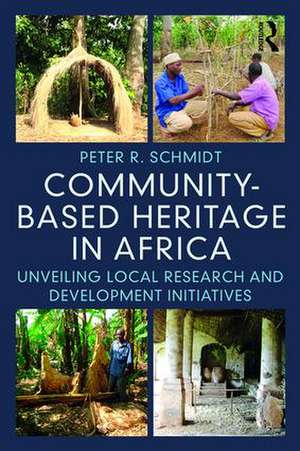Community-based Heritage in Africa: Unveiling Local Research and Development Initiatives
Autor Peter R. Schmidten Limba Engleză Paperback – 3 mar 2017
Examining three local initiatives, Schmidt draws on his experience as an anthropologist invited to collaborate and co-produce with the Haya to provide a poignant rendering of the successes, conflicts, and failures that punctuated their participatory community research efforts. This frank appraisal privileges local voices and focuses attention on the unique and important contributions that such projects can make to the preservation of regional history. Through this blend of personalized narrative and analytical examination, the book provides fresh insights into African archaeology and heritage studies.
Preț: 240.42 lei
Preț vechi: 295.96 lei
-19% Nou
Puncte Express: 361
Preț estimativ în valută:
46.01€ • 47.86$ • 37.98£
46.01€ • 47.86$ • 37.98£
Carte tipărită la comandă
Livrare economică 12-26 aprilie
Preluare comenzi: 021 569.72.76
Specificații
ISBN-13: 9781611329520
ISBN-10: 1611329523
Pagini: 288
Dimensiuni: 152 x 229 x 15 mm
Greutate: 0.42 kg
Ediția:1
Editura: Taylor & Francis
Colecția Routledge
Locul publicării:Oxford, United Kingdom
ISBN-10: 1611329523
Pagini: 288
Dimensiuni: 152 x 229 x 15 mm
Greutate: 0.42 kg
Ediția:1
Editura: Taylor & Francis
Colecția Routledge
Locul publicării:Oxford, United Kingdom
Public țintă
PostgraduateCuprins
Part I: Backdrop to Heritage Meanings
1: Prelude to the Unexpected
2: Setting, Place, and Heritage
Part II: A Biography of a Local Heritage Initiative
3: Disorientation and Recuperation: Relearning Heritage in Katuruka Village
4: Grassroots Heritage Work in Action
5: Spitting Pearls: Agendas for Community Research and Heritage Performance are Realized
6: Euphoria, Cargo Cult Expectations, and Hard Reality
7: Commentary: Fitting Buhaya into Global Perspectives
Part III: Community Research Findings
8: HIV/AIDS, The Living, and Memory
9: Intangible Heritage: Hope Lost over Erased Ethical Values
10: Commentary: Reflections on Human Rights, Senses of Place, and Heritage
11: Heritage Lost, Heritage Regained
12: Androcentric Perspectives, Subaltern Conundrums, and Learning from Snakes
13: Njeru, the "White Sheep" and her Snake.
With Eudes Bambanza and Zuriat Mohamed
Part IV: Reflections on the Katuruka Initiative
14: Progress while Negotiating Potholes
15: Harm by Greed: "Negotiating" Heritage Rights and Land Use
16: The Future of Katuruka: Is there Hope?
Part V: Spreading to other Communities and Concluding Thoughts
17: Heritage Ephemeral, Heritage Hidden, and Heritage Revealed at Kanazi Palace
18: Kanazi Palace, King Kahigi II, and Ethical Conundrums in Community Heritage Work
19: The “Cave of the Dead”: Genocide, Forgotten Heritage, and Education
20: Reflections and Connections
1: Prelude to the Unexpected
2: Setting, Place, and Heritage
Part II: A Biography of a Local Heritage Initiative
3: Disorientation and Recuperation: Relearning Heritage in Katuruka Village
4: Grassroots Heritage Work in Action
5: Spitting Pearls: Agendas for Community Research and Heritage Performance are Realized
6: Euphoria, Cargo Cult Expectations, and Hard Reality
7: Commentary: Fitting Buhaya into Global Perspectives
Part III: Community Research Findings
8: HIV/AIDS, The Living, and Memory
9: Intangible Heritage: Hope Lost over Erased Ethical Values
10: Commentary: Reflections on Human Rights, Senses of Place, and Heritage
11: Heritage Lost, Heritage Regained
12: Androcentric Perspectives, Subaltern Conundrums, and Learning from Snakes
13: Njeru, the "White Sheep" and her Snake.
With Eudes Bambanza and Zuriat Mohamed
Part IV: Reflections on the Katuruka Initiative
14: Progress while Negotiating Potholes
15: Harm by Greed: "Negotiating" Heritage Rights and Land Use
16: The Future of Katuruka: Is there Hope?
Part V: Spreading to other Communities and Concluding Thoughts
17: Heritage Ephemeral, Heritage Hidden, and Heritage Revealed at Kanazi Palace
18: Kanazi Palace, King Kahigi II, and Ethical Conundrums in Community Heritage Work
19: The “Cave of the Dead”: Genocide, Forgotten Heritage, and Education
20: Reflections and Connections
Descriere
This volume boldly shifts focus away from top-down community engagements, usually instigated by elite academic and heritage institutions, to examine locally initiated projects. Schmidt explores how and why local research initiatives, which are often motivated by rapid culture change caused by globalization, arose among the Haya people of western Tanzania. This frank appraisal privileges local voices and focuses attention on the unique and important contributions that such projects can make to the preservation of regional history. Through a blend of personalized narrative and analytical examination, the book provides fresh insights into African archaeology and heritage studies.
